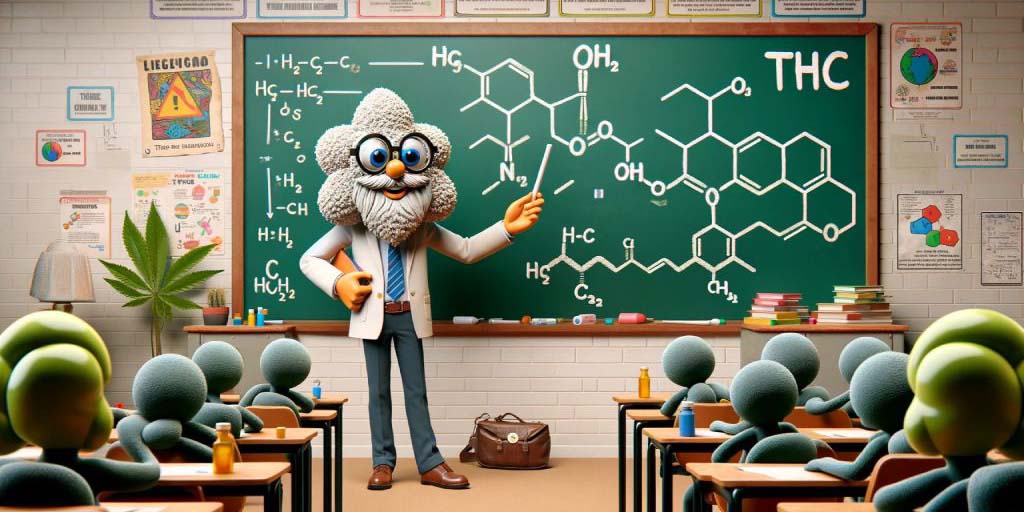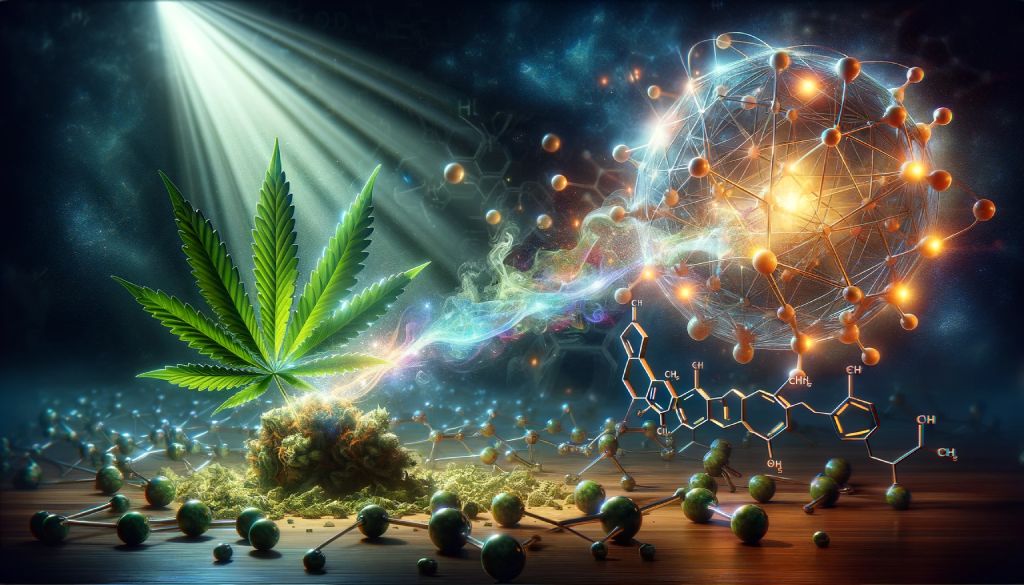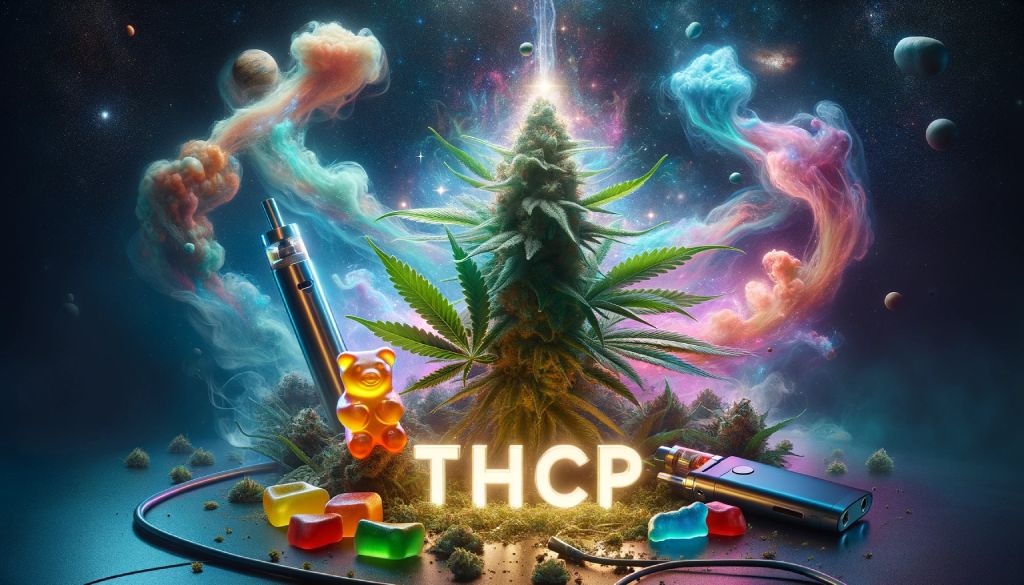
The abbreviation THC is hardly news to any cannabis enthusiast nowadays. Most people know THC as the component in cannabis that gets you high or stoned. Because today, more time, money, and technology are available to study this molecule properly, more variations and isolates are appearing on the market as well. You may have already heard of Delta-8 THC, HHC, or THCP. In this blog, we'll discuss what these "new cannabinoids" exactly are and what to expect from them.
THC
Let's start with a familiar one, THC, or Delta(Δ)-9-tetrahydrocannabinol. A long and complicated name for that psychoactive substance in weed that gets us high. But that long name turns out to be important because we are discovering more and more substances closely related to THC. THC occurs naturally in the flowers of Cannabis sativa, indica, and ruderalis. The first recreational and medicinal use of cannabis dates back millennia, even before the first mummies from Egypt! THC is the most well-known component of the cannabis plant, but certainly not the only one. Besides THC, there are hundreds of other substances in cannabis that influence its effects.

Delta-8
Delta-8 THC is a milder variant of the standard Delta-9 THC we already know. Like Delta-9, Delta-8 also occurs naturally in the flower buds of a cannabis plant. However, the Delta-8 products found on the market are not entirely natural but are often made from a CBD isolate synthesized into Delta-8 THC. Therefore, it's difficult to know exactly what you're dealing with without extensive testing. Delta-8 THC is usually sold as ready-to-use disposable vaporizers or edibles, such as gummies. Note! Delta-8 THC products are in a legal gray area; however, we advise against buying anything from a sketchy webshop.
Effects of Delta-8 THC
The effects of Delta-8 THC are similar to its more well-known brother Delta-9 THC. However, its potency, or strength, differs somewhat. Delta-8 THC is a milder variant and is about half as strong. By this, we mean that you get less high or stoned, but not necessarily for a shorter period. For these reasons, it is also called diet weed or light weed. One advantage of this could be that people sensitive to cannabis may experience fewer adverse effects such as anxiety or paranoia.

HHC
HHC stands for Hydrohexacannabinol and is structurally very similar to Delta-9-THC. HHC is a naturally occurring substance in cannabis, albeit in very small quantities. So small, in fact, that extracting HHC from cannabis plants is economically unfeasible. The HHC products found on the market are therefore synthetic, meaning they are made in a laboratory. Often, Delta-8-THC is used to make HHC. The process is very complex and never yields a pure end result. Undesirable and harmful substances, such as heavy metals, often end up in the final product. For this reason, alarm bells went off at the Vereniging Landelijk Overleg Smartproducten (VLOS), to which Dutch-Headshop is affiliated, regarding HHC. Our recommendation is therefore not to buy or use these products. It simply does not fit with responsible drug use.
Effects of HHC
Unfortunately, very little is known about the exact effects of HHC compared to regular THC. Users report that the psychoactive effect is similar to that of regular cannabis. Some say they experience less anxiety and confusion after using HHC compared to THC. Some users who have been using HHC for a longer period reported building a tolerance more quickly and experiencing more symptoms (withdrawal symptoms) when stopping.
Did you know? The discoverer of CBD, American chemist Roger Adams, also discovered Delta-8-THC and HHC in the early 1940s?
THCP
THCP is the last cannabinoid on the list. The full name is Tetrahydrocannabiphorol; quite a mouthful. This phytocannabinoid derived from the cannabis plant was discovered only recently, in 2019, by Italian Dr. Giuseppe Cannazza. Since THCP occurs naturally in extremely small amounts in cannabis, the THCP found on the market is mainly produced by chemically altering CBD.
Effects of THCP
Preliminary research has shown that THC-P has a 30 times greater binding affinity for CB1 receptors compared to regular THC. Based on this result, the conclusion is often incorrectly drawn that THCP is also thirty times stronger than THC. While it has been observed that THCP is stronger than THC, binding affinity and strength are not the same. It's also important to note that the psychoactive effects of cannabis are perceived and evaluated differently by everyone.

Experimenting with "new cannabinoids"?
All of these substances are naturally present in home-grown or coffeeshop cannabis, but in the proportions intended by Mother Nature. Because these "cannabinoids" are still new and unregulated, you will never know exactly what you are dealing with, and testing is only possible if you have your own laboratory. We therefore strongly advise against using these synthetic cannabinoids until they have undergone more research or are regulated.
Frequently Asked Questions about Synthetic Cannabis
- Can Delta-8, HHC, and THCP be detected in a drug test? Delta-8, HHC, and THC-P will give a positive result in most drug tests, such as urine, saliva, or sweat tests, as the substance is very similar to THC. However, these specific variants themselves are not detected in these tests (laboratory testing is required), but the result will still be positive.
- Is synthetic cannabis safe? Synthetic cannabis such as Delta-8, HHC, THCP, or products known as Spice or K2 are not natural products. The health risks are much higher. Additionally, these variants are often much stronger and more addictive. Due to unregulated use, deaths have even occurred, something that cannot happen with regular cannabis. Our advice: don't be a voluntary guinea pig.
